BusinessEurope Headlines No. 2019-18
European social policy: what’s the way forward?

“The way forward regarding social policy is to reform education and training systems, employment policies and regulations and social protection systems in a coherent way”, said BusinessEurope Director General Markus J. Beyrer at the 14th Congress of the European Trade Union Confederation (ETUC) on 21 May in Vienna. National trade union delegates from 38 European countries and special guests from Europe and beyond, including Jean-Claude Juncker, President of the European Commission, and Alexander Van der Bellen, President of Austria, participated at the event, which takes place until Friday 24 May. “It is very important that the European social partners regularly discuss their respective visions and what they can do together to make sure that the EU delivers for companies and workers”, Beyrer pointed out.
Contact: Maxime Cerutti
Photo copyright: Erik Luntang
Our comment
European elections 23-26 May - GO AND VOTE!
By Christian Feustel, Senior Policy Adviser
Dear co-citizens,
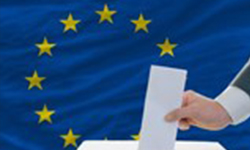 Today, the elections to the 9th European Parliament have started. They are arguably the most important elections since a long time. Do use your right to vote and contribute to electing a pro-European, open-minded and reform-oriented European Parliament.
Today, the elections to the 9th European Parliament have started. They are arguably the most important elections since a long time. Do use your right to vote and contribute to electing a pro-European, open-minded and reform-oriented European Parliament.
Our globalised world is changing at huge pace, and it is of utmost importance that we use the next five years to make our continent fit for the future. Businesses are ready to contribute and help to make this happen. Europe is our home market, Europe is our future!
BusinessEurope and its member federations have undertaken various positive actions to call on citizens and entrepreneurs to go and cast their vote. We must rally around an outward looking, pro-European project, and have to make sure that the new European institutions can immediately after the elections take up their work in this direction.
The European Union needs a long-term, bold reform agenda. With our Ambition for Europe 2030 we have made modern, bold and workable proposals in this direction. We stand ready to work with the new institutions, acting to help to make Europe fit for the future. Our citizens and enterprises expect us to work for our common better future.
Therefore, please go and vote, and don’t forget to convince your family members, colleagues, friends or neighbours to do the same. If you need some handy arguments, this EP website can help.
Thank you Europe for all past achievements, and good luck Europe, for a hopefully bright and common future!
![]() Contact: Christian Feustel
Contact: Christian Feustel
SMEs must be supported in their innovation efforts
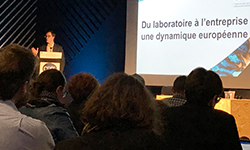 “SMEs are a powerful economic engine for Europe and a pillar of innovation both individually and in collaboration with other entities”, said BusinessEurope Director for Industrial Affairs, Entrepreneurship and SMEs Alexandre Affre at the event “Du laboratoire à l’entreprise : une dynamique européenne” (From the laboratory to the company: a European dynamic) organised by the French National Centre for Scientific Research (CNRS) in Brussels on 21 May. Participants to the conference were, among others, representatives from EU institutions and business associations and research directors from different European regions. In a discussion on the innovation challenges faced by the EU, Affre explained that a European SME policy must go hand in hand with a European innovation policy: “SMEs are willing to innovate, but encounter difficulties in scaling up in Europe due to the lack of a real European Single Market and of venture capitals”. Looking ahead to the upcoming European elections, Affre stressed that the EU shall prioritise innovation in its political agenda, if it wants to remain a leading economy in the world, stand up to societal challenges and be relevant to citizens. More pro-innovation legislation, business-oriented funding programmes and skills developments will be key to boost investments in research and innovation in Europe in the years to come.
“SMEs are a powerful economic engine for Europe and a pillar of innovation both individually and in collaboration with other entities”, said BusinessEurope Director for Industrial Affairs, Entrepreneurship and SMEs Alexandre Affre at the event “Du laboratoire à l’entreprise : une dynamique européenne” (From the laboratory to the company: a European dynamic) organised by the French National Centre for Scientific Research (CNRS) in Brussels on 21 May. Participants to the conference were, among others, representatives from EU institutions and business associations and research directors from different European regions. In a discussion on the innovation challenges faced by the EU, Affre explained that a European SME policy must go hand in hand with a European innovation policy: “SMEs are willing to innovate, but encounter difficulties in scaling up in Europe due to the lack of a real European Single Market and of venture capitals”. Looking ahead to the upcoming European elections, Affre stressed that the EU shall prioritise innovation in its political agenda, if it wants to remain a leading economy in the world, stand up to societal challenges and be relevant to citizens. More pro-innovation legislation, business-oriented funding programmes and skills developments will be key to boost investments in research and innovation in Europe in the years to come.
Contact: Daniele Olivieri
EU’s trade policy has significantly evolved
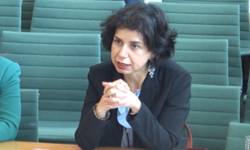 “The EU trade policy has evolved to become more transparent and inclusive. Negotiating proposals are now made public and stakeholders can provide inputs through expert groups”, said Luisa Santos, BusinessEurope Director for International Relations, before the International Trade Select Committee at the House of Commons in London on 22 May. Her appearance before Members of the UK Parliament to speak on the EU Trade Policy and Strategy was part of an evidence session, to update the Committee on recent developments in the EU’s approach to trade issues, particularly with regards to options for the development of a UK trade policy in the context of Brexit. Besides Santos, also representatives of the British Trade Union Congress (TUC), the European Consumer Organisation (BEUC) and the agricultural umbrella organisation COPA-COGECA were invited to provide evidence. “With the Multilateral trading system under pressure it is important for the EU to continue using bilateral trade agreements to pursue ambitious rules in areas like digital trade”, Santos highlighted.
“The EU trade policy has evolved to become more transparent and inclusive. Negotiating proposals are now made public and stakeholders can provide inputs through expert groups”, said Luisa Santos, BusinessEurope Director for International Relations, before the International Trade Select Committee at the House of Commons in London on 22 May. Her appearance before Members of the UK Parliament to speak on the EU Trade Policy and Strategy was part of an evidence session, to update the Committee on recent developments in the EU’s approach to trade issues, particularly with regards to options for the development of a UK trade policy in the context of Brexit. Besides Santos, also representatives of the British Trade Union Congress (TUC), the European Consumer Organisation (BEUC) and the agricultural umbrella organisation COPA-COGECA were invited to provide evidence. “With the Multilateral trading system under pressure it is important for the EU to continue using bilateral trade agreements to pursue ambitious rules in areas like digital trade”, Santos highlighted.
Contact: Benedikt Wiedenhofer
Digitalisation and the society discussed
 On 22 May BusinessEurope Director for Internal Market Martynas Barysas spoke at a public hearing of the European Economic and Social Committee (EESC) dedicated to opportunities provided by the digital revolution in the areas of transport, energy and services of general interest. The rapporteurs of the draft EESC opinion and invited panel members from the European Commission, business and workers’ organisations, and sustainable development promoters discussed the best uses of digitalisation for the benefit of the society. Issues of openness to innovation, regulatory framework, consumer protection, participation of workers in digitalisation, infrastructure, skills and financing were brought up. Barysas stressed that BusinessEurope suggests to start with an overall approach to digitalisation as an opportunity. “For the business community, Europe’s digital identity stands equally between innovative freedom and guardians of societal interests”, he said. A framework that is innovation friendly and predictable, the one that provides opportunities and is investment-conducive should be combined with the support to people so that they succeed in digitalisation. This also means huge investments needed in infrastructure, technology development, and human capital – from basic education to re-skilling. Trust enablers, such as implementation of the General Data Protection Regulation (GDPR) and building of cyber-security capacities, need a very well-coordinated European approach. The policy choices should by all means avoid rush in decisions, especially where no evidence of market failures exists, as this might cause huge losses to the society being barred from benefits the technology can bring.
On 22 May BusinessEurope Director for Internal Market Martynas Barysas spoke at a public hearing of the European Economic and Social Committee (EESC) dedicated to opportunities provided by the digital revolution in the areas of transport, energy and services of general interest. The rapporteurs of the draft EESC opinion and invited panel members from the European Commission, business and workers’ organisations, and sustainable development promoters discussed the best uses of digitalisation for the benefit of the society. Issues of openness to innovation, regulatory framework, consumer protection, participation of workers in digitalisation, infrastructure, skills and financing were brought up. Barysas stressed that BusinessEurope suggests to start with an overall approach to digitalisation as an opportunity. “For the business community, Europe’s digital identity stands equally between innovative freedom and guardians of societal interests”, he said. A framework that is innovation friendly and predictable, the one that provides opportunities and is investment-conducive should be combined with the support to people so that they succeed in digitalisation. This also means huge investments needed in infrastructure, technology development, and human capital – from basic education to re-skilling. Trust enablers, such as implementation of the General Data Protection Regulation (GDPR) and building of cyber-security capacities, need a very well-coordinated European approach. The policy choices should by all means avoid rush in decisions, especially where no evidence of market failures exists, as this might cause huge losses to the society being barred from benefits the technology can bring.
![]() Contact: Martynas Barysas
Contact: Martynas Barysas
Photo copyright: EESC
The strategic importance of the EU-Mexico deal
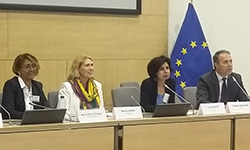 On 20 May, Luisa Santos, BusinessEurope Director for International Relations, participated in the stakeholder event “The modernised EU-Mexico Global Agreement: better rules, common values and more opportunities for trade and investment”, organised by the European Commission in Brussels. “This agreement has an important strategic dimension for European businesses in the North-American continent. The old agreement is no longer in tune with contemporary trade, we need new tools to unleash opportunities in public procurement and to promote the European approach to geographical indications, for example”, Santos said. The modernised deal promotes a rules-and values-based trade policy, includes strong and clear commitments on sustainable development and, for the first time in an EU free trade agreement, there is a chapter dedicated to the fight against corruption. “We look forward to the conclusion of the last technical elements of the agreement and to its swift entry into force”, Santos concluded.
On 20 May, Luisa Santos, BusinessEurope Director for International Relations, participated in the stakeholder event “The modernised EU-Mexico Global Agreement: better rules, common values and more opportunities for trade and investment”, organised by the European Commission in Brussels. “This agreement has an important strategic dimension for European businesses in the North-American continent. The old agreement is no longer in tune with contemporary trade, we need new tools to unleash opportunities in public procurement and to promote the European approach to geographical indications, for example”, Santos said. The modernised deal promotes a rules-and values-based trade policy, includes strong and clear commitments on sustainable development and, for the first time in an EU free trade agreement, there is a chapter dedicated to the fight against corruption. “We look forward to the conclusion of the last technical elements of the agreement and to its swift entry into force”, Santos concluded.
Contact: Eleonora Catella
EU-Japan agreement: focus on implementation and regulatory cooperation
 “The economic partnership agreement (EPA) between the EU and Japan is a milestone, unlocking growth and enhancing rules-based trade at a time when protectionism surfaces around the world”, said Luisa Santos, BusinessEurope Director for International Relations, during a panel discussion on tangible prospects under the EPA at the 2nd EU-Japan EPA forum in Milan on 16 May. She added that “now that the agreement has entered into force, the focus will be on implementation as well as regulatory cooperation”. Santos pointed out that one issue we have already witnessed relates to the new system of self-certification for products benefiting from preferential treatment. Besides the exporter’s declaration on origin, Japanese customs officials request a number of additional documents to prove origin, which was not the intention of this new system. “This problem has already been acknowledged, and we are confident that it will be addressed soon”, she stated. Regulatory cooperation will now form the basis for long-term access to each other’s markets and setting high standards in new and existing product areas globally. For an overview of the expected benefits from the EU-Japan EPA, please click here.
“The economic partnership agreement (EPA) between the EU and Japan is a milestone, unlocking growth and enhancing rules-based trade at a time when protectionism surfaces around the world”, said Luisa Santos, BusinessEurope Director for International Relations, during a panel discussion on tangible prospects under the EPA at the 2nd EU-Japan EPA forum in Milan on 16 May. She added that “now that the agreement has entered into force, the focus will be on implementation as well as regulatory cooperation”. Santos pointed out that one issue we have already witnessed relates to the new system of self-certification for products benefiting from preferential treatment. Besides the exporter’s declaration on origin, Japanese customs officials request a number of additional documents to prove origin, which was not the intention of this new system. “This problem has already been acknowledged, and we are confident that it will be addressed soon”, she stated. Regulatory cooperation will now form the basis for long-term access to each other’s markets and setting high standards in new and existing product areas globally. For an overview of the expected benefits from the EU-Japan EPA, please click here.
Contact: Maurice Fermont
A lot more to be done on the Single Market for Services
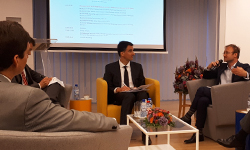 On 20 May BusinessEurope Director for Internal Market Martynas Barysas spoke at a seminar on the future of the Single Market for services, organised by the Permanent Representation of Poland to the EU and attended by, primarily, officials from Permanent Representations of the Member States. The panel of speakers from the research organisations, EU institutions, Member States, the OECD and BusinessEurope exchanged views on the state of play of integration in services markets, reasons and consequences of slow progress over the last five to ten years, and the way forward. There were different views on the underlying challenges and possible solutions from different speakers, however views converged on the fact that implementation and enforcement of the present framework for services was not at all satisfactory neither uniform, and the responsibility for this lies primarily with the Member States. “Incorrect and uneven interpretation and application of rules create tensions on the market and among Member States, and these tensions consequently spill into negotiations on any attempt to integrate the services markets further”, Barysas said. He pointed out that it is also crucial to take a broader approach on the framework for services beyond the Services Directive or Professional Qualifications Directive. Servitisation of industry should be given much more consideration. Industrial, digital economy, consumer protection policies are directly linked to cross-border service provision. The Single Market for services should not be discussed in isolation from these and its role for the manufacturing sector and the European economy at large should not be underestimated. Various examples of the issues businesses face were mentioned, from the way A1 forms under the social legislation are required to the challenges in public procurement tendering or barriers for transport service provision. Stronger commitment with dedication of resources to good implementation would be the first step to start in the short term, but “there is really a lot more to be done for further integration of the services markets”, Barysas added.
On 20 May BusinessEurope Director for Internal Market Martynas Barysas spoke at a seminar on the future of the Single Market for services, organised by the Permanent Representation of Poland to the EU and attended by, primarily, officials from Permanent Representations of the Member States. The panel of speakers from the research organisations, EU institutions, Member States, the OECD and BusinessEurope exchanged views on the state of play of integration in services markets, reasons and consequences of slow progress over the last five to ten years, and the way forward. There were different views on the underlying challenges and possible solutions from different speakers, however views converged on the fact that implementation and enforcement of the present framework for services was not at all satisfactory neither uniform, and the responsibility for this lies primarily with the Member States. “Incorrect and uneven interpretation and application of rules create tensions on the market and among Member States, and these tensions consequently spill into negotiations on any attempt to integrate the services markets further”, Barysas said. He pointed out that it is also crucial to take a broader approach on the framework for services beyond the Services Directive or Professional Qualifications Directive. Servitisation of industry should be given much more consideration. Industrial, digital economy, consumer protection policies are directly linked to cross-border service provision. The Single Market for services should not be discussed in isolation from these and its role for the manufacturing sector and the European economy at large should not be underestimated. Various examples of the issues businesses face were mentioned, from the way A1 forms under the social legislation are required to the challenges in public procurement tendering or barriers for transport service provision. Stronger commitment with dedication of resources to good implementation would be the first step to start in the short term, but “there is really a lot more to be done for further integration of the services markets”, Barysas added.
Contact: Martynas Barysas
Calendar
- 23-24 May: Energy Infrastructure Forum
- 23-26 May: European elections
- 5 June: Danish elections
Reminder: please take a look at our revised privacy policy